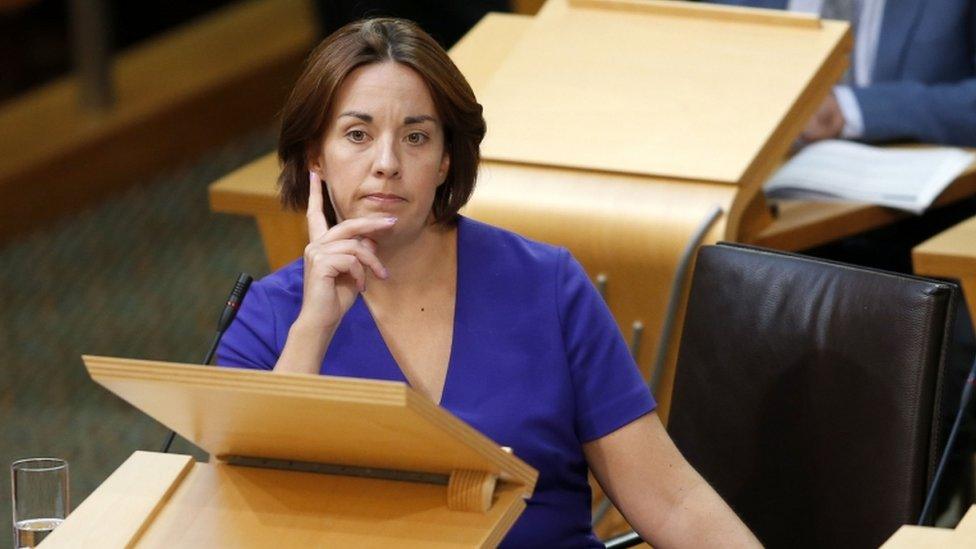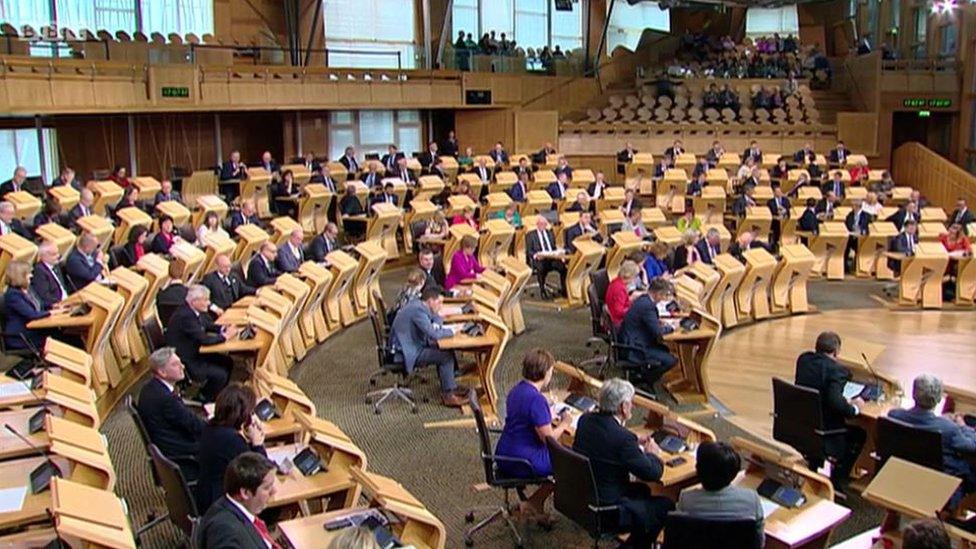Row over Kezia Dugdale vote as government avoids defeat
- Published

Ms Dugdale insists she did vote - but parliamentary authorities say everything was working as it should have done
Scottish Labour leader Kezia Dugdale has failed to register a vote at Holyrood - allowing the Scottish government to avoid a defeat.
A majority of MSPs backed a Conservative amendment which said the government's council tax proposals undermined local accountability.
But when it came to the final decision, the vote was tied at 63 all - with Ms Dugdale apparently not voting.
The presiding officer then used his casting vote to back the government.
Working properly
The Scottish Parliament uses an electronic system that allows MSPs to cast votes by pushing a button while remaining in their seats.
Ms Dugdale has insisted she did vote - with her party calling for an investigation into what happened.
But parliament officials said they had checked the voting consoles in the chamber and were satisfied the system was working properly.

Ms Dugdale (front centre) was in the Scottish Parliament chamber at the time of the vote
Ms Dugdale tweeted: "Today I categorically voted to reject the SNP's council tax proposals. They made a promise to the people of Scotland - they should keep it."
Scottish Labour's business manager, James Kelly, said: "Every Scottish Labour MSP voted against the government today."
Ms Dugdale was in the Scottish Parliament chamber at the time and had voted previously.
She was sitting next to Labour MSP Iain Gray, who has also said that Ms Dugdale had cast a vote and that it had apparently registered with the system.

Analysis by BBC Scotland political reporter Philip Sim
Of all the votes for this to happen on; and of all the MSPs for it to happen to.
The SNP were staring defeat in the face; in fact having lost the vote on the amendment they were expecting it.
They were as relieved when the score came out 63-each as opposition members were outraged. Who had let the air out of their carefully planned manoeuvre to embarrass the government?
Kezia Dugale was as surprised as anyone else when the votes were tallied and it turned out to have been her.
Now, in truth this is still a shot across the bows for the government. They are a minority administration with, on this issue, no opposition support.
The SNP know they will need to change something before the next vote on council tax, to win over at least one opposition MSP.
But in the end instead of being an immediate embarrassment for them, it's Labour who have been left with red faces.

The SNP hailed Ms Dugdale as a "lone ranger" who had "taken her newfound autonomy literally" - a tongue-in-cheek reference to proposed changes to the relationship between Scottish and UK Labour.
A spokesman for the Scottish Conservatives said: "Notwithstanding the confusion over Kezia Dugdale's vote, the SNP has been sent a very clear signal that it must rethink its council tax plans."
The council tax changes, which were set out by First Minister Nicola Sturgeon in March, would see the average band E household pay about £2 more per week, with those in the highest band paying an extra £10 a week - an average of £517 a year.
The aim is to raise an extra £100m a year for schools as part of efforts to close the attainment gap between Scotland's wealthiest and most deprived pupils.
The reforms follow a report by the Commission on Local Tax Reform which last year called for council tax to be scrapped altogether, and urged politicians to implement a fairer, more progressive and transparent tax to fund local services.

The average annual increase in council tax as a result of the band adjustments announced by Ms Sturgeon will be:
band E - £105
band F - £207
band G - £335
band H - £517

During a debate earlier on Thursday, Finance Secretary Derek Mackay hinted that the Scottish government could consider further reform of the council tax system.
He said: "We have embarked on a journey in local taxation. We want to make it more progressive, deliver the steps that we got support for at the elections, then engage further on what can be delivered next in view of the report."
Conservative Murdo Fraser said the SNP appeared to have abandoned a 2007 manifesto pledge to replace council tax with a local income tax.
Mr Fraser said the Tories supported an end to the council tax freeze, additional protections for low-income households and higher charges for those in properties in bands G and H, but opposed increases for homes in bands E and F.
The Scottish government also came under fire from Labour's Jackie Baillie and Green MSP Andy Wightman, who both served on the local tax commission.
'Mere whimper'
Ms Baillie said: "Here are the SNP simply tinkering with the bands and keeping in their words a hated and unfair council tax. Exactly what the SNP said they were against.
"They say that actions speak louder than words. The SNP's actions in this case are a mere whimper."
Mr Wightman said it had taken the commission "two nanoseconds" to decide the current system should be abolished.
He also criticised Scottish government plans to use the £100m extra cash that will be raised from its reforms to improve education.
Mr Wightman said: "This is the first time in the history of local taxation since the introduction of the Poor Law in 1579 that local taxation has been appropriated for national spending priorities."
He said there could be a "progressive majority" in Holyrood for a revaluation, with the current system based on property values dating back to 1991 - a situation Mr Wightman says has left many properties in the wrong band.